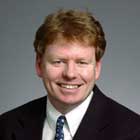Keynote Speaker
 Gregory O'Hare Senior Lecturer, & Director of the Practice and Research in Intelligent Systems & Media (PRISM) Laboratory, University College Dublin, Ireland |
Abstract Ubiquitous Intelligence: The Case for Multi-Agent Systems in the Mobile & Ubiquitous Arena Biography Gregory O'Hare, CLARITY: The Centre for Sensor Web Technologies, University College Dublin (UCD), is a Senior Lecturer and a former Head of School (2001-2004) in the School of Computer Science and Informatics at University College Dublin. Previously, he was a member of faculty at the University of Manchester Institute of Science and Technology (UMIST) and The University of Central Lancashire, UK. His research focuses upon Multi-Agent Systems (MAS) , Ubiquitous Computing and Wireless Sensor Networks. He has published over 265 journal and conference papers in these areas together with two text books. He has secured circa 28.5 Million euro research funding in his career to date. O'Hare is a Fellow of the British Computer Society a member of the ACM, AAAI, IEEE, ICS and a Chartered Engineer. 2004-2008 he was awarded an SFI principal Investigator award. In 2008 he together with 4 other Principal Investigators he secured a prestigeous Science Foundation Ireland (SFI) Centre for Science & Engineering Technology (CSET) Award entitled CLARITY: The Centre for Sensor Web Technologies valued at 16.5 Million euro. |
 Professor John Leonard Department of Mechanical Engineering and CSAIL, MIT |
Abstract The MIT DARPA Urban Challenge Team This talk will describe Team MIT's performance in the 2007 DARPA Urban Challenge (DUC), which was held from October 26 though November 3rd in Victorville, CA. MIT was one of thirty five teams that participated in the DUC national qualifying event (NQE), and was one of eleven teams to qualify for the Urban Challenge final event based on our performance in NQE. Our team was one of six teams to complete the race, finishing in fourth place. We will review the design of our autonomous vehicle, Talos, a Land Rover LR3 equipped with a diverse range of lidar, vision, radar, and navigation sensors connected to a powerful blade cluster computer system. Our vehicle employed novel algorithmic approaches to perception, planning and control for the challenging task of autonomous driving in uncertain, dynamic environments. The performance of our system in the NQE and race events will be reviewed, and ideas for future research will be discussed. For more information, see https://grandchallenge.mit.edu Joint work with Matt Antone, David Barrett, Mitch Berger, Ryan Buckley, Stefan Campbell, Alexander Epstein, Gaston Fiore, Luke Fletcher, Emilio Frazzoli, Robert Galejs, Jonathan How, Albert Huang, Karl Iagnemma, Troy Jones, Sertac Karaman, Olivier Koch, Siddhartha Krishnamurthy, Yoshi Kuwata, Keoni Maheloni, David Moore, Katy Moyer, Edwin Olson, Andrew Patrikalakis, Steve Peters, Stephen Proulx, Nicholas Roy, Daniela Rus, Chris Sanders, Seth Teller, Justin Teo, Robert Truax, Matthew Walter, and Jonathan Williams. Biography John J. Leonard is Professor of Mechanical and Ocean Engineering in the MIT Department of Mechanical Engineering and a member of the MIT Computer Science and Artificial Intelligence Laboratory (CSAIL). His research addresses the problems of navigation and mapping for autonomous mobile robots. He holds the degrees of B.S.E.E. in Electrical Engineering and Science from the University of Pennsylvania (1987) and D.Phil. in Engineering Science from the University of Oxford (formally 1994). He studied at Oxford under a Thouron Fellowship and Research Assistantship funded by the ESPRIT program of the European Community. Prof. Leonard joined the MIT faculty in 1996, after five years as a Post-Doctoral Fellow and Research Scientist in the MIT Sea Grant Autonomous Underwater Vehicle (AUV) Laboratory. He has participated in numerous field deployments of AUVs, including under-ice operations in the Arctic and several major experiments in the Mediterranean. He has served an associate editor of the IEEE Journal of Oceanic Engineering and of the IEEE Transactions on Robotics and Automation. He is the recipient of an NSF Career Award (1998), an E.T.S. Walton Visitor Award from Science Foundation Ireland (2004), and the King-Sun Fu Memorial Best Transactions on Robotics Paper Award (2006). |
 Professor Hannes Hartenstein University of Karlsruhe |
Abstract Vehicular Networks - Quo Veheris? This talk provides thoughts on the past, present and future of vehicle-to-X communications. We survey research results achieved in the last ten years and try to assess how well the currently available approaches and solutions meet the challenges of providing improvements with respect to traffic safety, traffic efficiency and environmental friendliness. Key aspects addressed in this talk are the issues of how to avoid congestion of the radio channel and of how to show the impact of wireless vehicular communications on safety and efficiency. We also look at current traffic telematics systems and analyze how the upcoming vehicle-to-X communication will fit into the big picture of cooperative systems. Finally, we state some “grand challenges” of vehicular communications and present next steps, in particular with respect to field operational tests. Biography Hannes Hartenstein is a full professor for decentralized systems and network services at the Karlsruhe Institute of Technology (KIT), Germany, which is formed by the University of Karlsruhe and the Research Center Karlsruhe. Prior to joining University of Karlsruhe, he was a senior research staff member with NEC Europe. He was NEC's project leader (2001-2003) for the 'FleetNet - Internet on the Road' project partly funded by the German Ministry of Education and Research (BMBF), actively particpating in the 'NOW: Network on Wheels' project (2004-2008) and is now involved in the European PreDrive-C2X project. He was TPC co-chair and general chair of various respected ACM and IEEE international workshops and symposia on vehicular communications. His research interests include inter-vehicle communications, peer-to-peer networks, sensor networks, and IT management. He holds a diploma in mathematics and doctoral degree in computer science, both from Albert-Ludwigs-Universität, Freiburg, Germany. |



